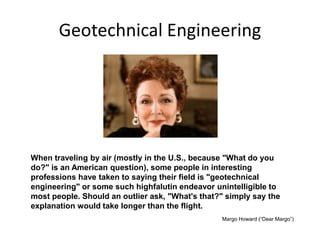Geotheta - Questions
Geotheta - Questions
Blog Article
What Does Geotheta Mean?
Table of ContentsRumored Buzz on GeothetaThe 8-Second Trick For GeothetaThe Main Principles Of Geotheta The 8-Second Trick For GeothetaA Biased View of Geotheta

They conduct website examinations, collect samples, execute laboratory tests, and assess data to assess the viability of the ground for construction jobs - Consulting Engineers. Based upon their findings, geotechnical designers provide suggestions for structure layout, incline security, retaining structures, and mitigation of geotechnical dangers. They team up with other professionals, such as designers, structural engineers, and building groups, to make certain that geotechnical factors to consider are incorporated right into the overall project layout and execution
By assessing the behavior and homes of dirt and rock, they can determine prospective geotechnical risks such as landslides, soil settlement, or slope instability. Their competence assists avoid failures or crashes that can jeopardize lives and property. Right here are some comprehensive responsibilities and responsibilities of a geotechnical designer: Website Examination: Geotechnical engineers conduct site investigations to gather information on subsurface conditions.
They analyze the information to recognize the residential or commercial properties and habits of the soil and rock, including their stamina, leaks in the structure, compaction features, and groundwater problems. Geotechnical Evaluation and Layout: Geotechnical designers assess the information accumulated throughout website examinations to examine the security and viability of the site for building projects. They perform geotechnical calculations and modeling to examine aspects such as bearing capability, negotiation, incline security, lateral earth pressures, and groundwater circulation.
Geotheta Can Be Fun For Anyone
Foundation Design: Geotechnical designers play an important function in creating structures that can securely support the desired structure. They evaluate the dirt conditions and lots demands to identify the ideal foundation type, such as superficial foundations (e.g., grounds), deep foundations (e.g (https://giphy.com/channel/geotheta)., heaps), or specialized strategies like dirt enhancement. They think about elements such as settlement restrictions, birthing capability, and soil-structure interaction to establish optimum structure styles
They review construction strategies, screen site activities, and conduct field examinations to validate that the style suggestions are followed. If unforeseen geotechnical concerns develop, they evaluate the situation and give referrals for remediation or adjustments to the layout. Danger Assessment and Reduction: Geotechnical engineers examine geotechnical risks and risks related to the job site, such as landslides, liquefaction, or dirt erosion.

Partnership and Communication: Geotechnical designers work very closely with various other professionals associated with a task, such as architects, architectural engineers, and construction groups. Effective interaction and partnership are vital to incorporate geotechnical considerations right into the general project style and construction process. Geotechnical engineers give technical know-how, answer questions, and make sure that geotechnical requirements are fulfilled.
Geotheta for Beginners
Right here are some sorts of geotechnical designers: Foundation Engineer: Structure designers focus on designing and analyzing foundations for structures. They examine the dirt problems, load requirements, and site features to identify the most proper structure kind and design, such as shallow foundations, deep foundations, or specialized methods like stack structures.
They review the variables influencing slope stability, such as soil residential properties, groundwater conditions, and slope geometry, and establish techniques to avoid incline failings and minimize threats. Quake Designer: Quake designers focus on examining and creating frameworks to withstand seismic pressures. They evaluate the seismic hazard of a site, review dirt liquefaction capacity, and develop seismic design requirements to make sure the safety and security and strength of structures throughout quakes.
They do field testing, collect examples, and assess the accumulated data to characterize the soil homes, geologic formations, and groundwater conditions at a website. Geotechnical Instrumentation Engineer: Geotechnical instrumentation engineers concentrate on tracking and determining read the article the behavior of dirt, rock, and structures. They install and keep instrumentation systems that keep an eye on factors such as soil negotiation, groundwater levels, slope activities, and architectural variations to evaluate efficiency and provide very early warnings of prospective problems.
See This Report on Geotheta
They conduct examinations such as triaxial examinations, combination tests, straight shear tests, and leaks in the structure examinations to gather information for geotechnical analysis and style. Geosynthetics Engineer: Geosynthetics engineers specialize in the style and application of geosynthetic materials, such as geotextiles, geogrids, and geomembranes. They make use of these materials to boost dirt stability, enhance inclines, supply drainage options, and control disintegration.
They have a tendency to be investigatory individuals, which indicates they're intellectual, reflective, and curious. They are interested, systematic, rational, analytical, and logical. A few of them are likewise social, meaning they're kind, charitable, cooperative, client, caring, useful, compassionate, skillful, and pleasant. Does this audio like you? Take our free job test to discover out if geotechnical engineer is among your top occupation suits.
In the office environment, geotechnical designers make use of specialized software program tools to perform calculations, create layouts, and assess information. They prepare reports, review job specs, communicate with clients and staff member, and coordinate task activities. The office setting gives a favorable environment for study, analysis, and collaboration with other professionals entailed in the task.
All About Geotheta
They regularly check out task sites to carry out website examinations, evaluate geotechnical problems, and gather information for analysis. These gos to entail traveling to different areas, sometimes in remote or tough surfaces. Geotechnical designers may do soil sampling, conduct examinations, and monitor construction activities to make certain that the geotechnical elements of the task are being implemented properly.
Geotechnical engineers also function in specialized geotechnical research laboratories. In these facilities, they carry out experiments, execute tests on soil and rock examples, and assess the engineering properties of the materials. Geotechnical lab designers function thoroughly in these environments, dealing with testing tools, operating tools, and tape-recording data. They team up with various other laboratory staff to make sure exact and reliable testing results.
Report this page